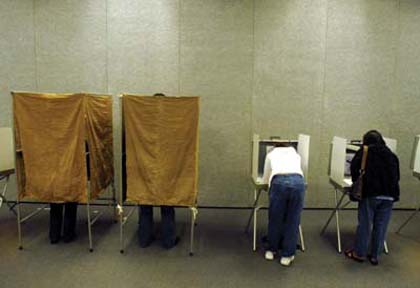While this board and its members’ conflicting views on Measure J reflect the wider community’s disparity in opinions, there is general agreement on one thing: Organized campaigns on both sides of the issue have used deception in trying to steer public sentiments.
Measure J is the initiative on the November ballot aiming to ban enhanced extraction methods used by the oil industry such as fracking, cyclic steaming and acidizing. It would also prohibit all petroleum activities in rural residential zones near Hollister and San Juan Bautista.
Measure supporters have argued it is needed to, among other reasons, protect against water contamination, depletion of water resources, potential earthquakes caused by hydraulic fracturing and negative impacts on such species as the endangered California condor.
Opponents have argued that it would, among other reasons, restrict property rights, shut down all petroleum activities due to a need to use enhanced extraction practices in this county, enhanced methods have been used safely for decades and that there are no fracking projects happening or proposed here.
Both campaigns also have accused the other of being deceptive in their respective messages to the public and they are both certainly right on that conclusion.
The No on Measure J side has claimed the initiative would ban all petroleum activities in San Benito County. That is misleading – as the initiative would ban all petroleum activities in less than 10 percent of the county, in those rural residential zones around the cities.
The Yes on Measure J side has focused its campaign on an emotion-laced activity – fracking – which isn’t happening here and isn’t proposed here. The most relevant targets from the pro-measure side are other enhanced extraction methods such as steam injections, used to heat non-mobile oil so it can flow and common in California.
With this board’s members coming down on both sides of this monumental matter – for the county and state – we felt it was most important to share some of our key considerations outside of this measure’s campaign deception, including the following:
• State regulations are not strong enough when it pertains to truth and deception in political advertising.
• Farmers and ranchers don’t want water contamination, but it appears most of them are against Measure J. That would tend to show confidence from the agriculture community – that fracking and other enhanced methods are safe for groundwater supplies.
• Measure J is necessary to protect from groundwater contamination and further depletion of precious water resources, but it has become an overly emotional issue for many people and is bound to get more contentious and personal as the election approaches. It is also necessary to ban petroleum activities in residential zones near the two cities. There are serious environmental risks ranging from effects on groundwater to air quality to species.
• This is primarily a property-rights issue, with Measure J supporters telling people what they can do with their land. It is ludicrous to suggest that ranchers and farmers opposing Measure J would want their children drinking contaminated water.
• If the measure were just about a ban on fracking – and excluded bans on other practices and the petroleum ban in certain areas – it would have a good chance of passage.
• Arguing the measure wouldn’t shut down the oil industry here is like saying you can eat soup with a fork. Steaming or other enhanced practices are needed to pump oil here due to the geology.
• It makes no sense to be dependent on other countries for oil when the U.S. can produce it here.
• With millions of dollars from the oil industry devoted to local petroleum initiatives like the one proposed in San Benito County, this county may well be serving as a test case for prospects going forward when it pertains to similar legislation.
• The amount of outside influence is concerning considering this is a local measure.
• Senate Bill 4 is approved and will provide some of the strongest regulations in the nation relating to extraction.
• Creating a variation of local ordinances leads to inconsistency throughout the state.
56.9
F
Hollister
May 18, 2024









